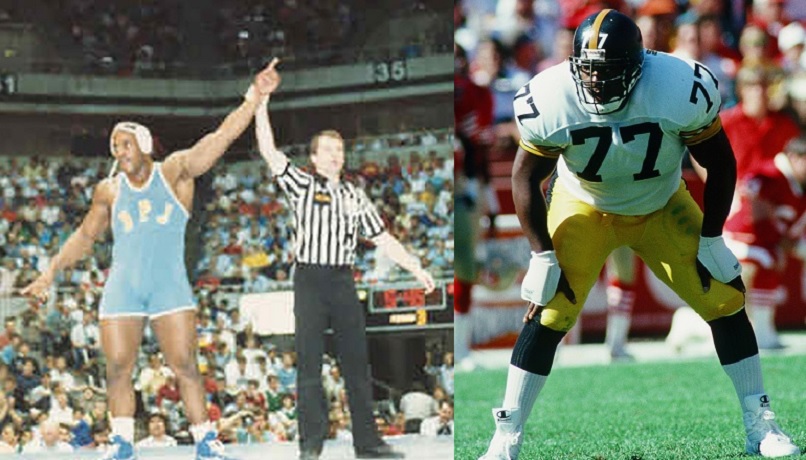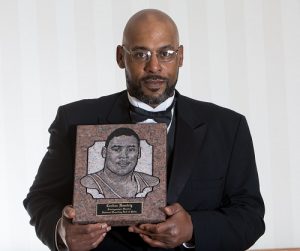
Distinguished Member Carlton Haselrig Passes Away
Carlton Haselrig, a Distinguished Member inducted into the National Wrestling Hall of Fame in 2016, passed away on Wednesday, at the age of 54.
The Tribune-Democrat in his hometown of Johnstown, Pennsylvania, reported that Cambria County Coroner Jeffrey Lees said Haselrig collapsed at his home. The coroner said the death is believed to be of natural causes and that an autopsy will be conducted.
“On behalf of our Board of Governors and staff, we extend our heartfelt sympathies to Carlton’s wife, Michelle, their children, family, friends and fans on his sudden passing,” said Lee Roy Smith, Executive Director. “He will be greatly missed, but will always be considered one of the greatest collegiate wrestlers and athletes of all time. For being such an accomplished athlete, Carlton will be remembered as one of the most humble, approachable and grateful individuals to have put on a wrestling singlet or football uniform.”
If national titles are the standard used to measure greatness, then Carlton Haselrig ranks as the top heavyweight in collegiate history. In an era when NCAA Division II national champions could compete just a few days later in the Division I tournament, Haselrig took on all comers. Six times he advanced to the finals of an NCAA tournament. Six times his hand was raised.
Haselrig’s unprecedented run of success at the top level prompted the NCAA to create the so-called “Haselrig Rule,” which bars small-school champions from moving on to the Division I tournament. That means his six titles will likely never be matched.
Named to the NCAA 75th Anniversary Team in 2005, he had a career record of 143-2-1 for the University of Pittsburgh at Johnstown. He set an NCAA record with 122 consecutive matches without a loss, and never lost or tied a match in Division II while never losing at the NCAA Division I Tournament (15-0). In 1987, 1988 and 1989, he won two NCAA titles each year.
 Because Greater Johnstown High School did not have a wrestling program, Haselrig played football during the school year and competed in freestyle wrestling in the summer. Prior to his senior year, the Greater Johnstown School Board gave him permission to represent Greater Johnstown High as an independent one-man team. In his only prep season, he went 10-0 and won the district, regional and state titles in the unlimited weight class.
Because Greater Johnstown High School did not have a wrestling program, Haselrig played football during the school year and competed in freestyle wrestling in the summer. Prior to his senior year, the Greater Johnstown School Board gave him permission to represent Greater Johnstown High as an independent one-man team. In his only prep season, he went 10-0 and won the district, regional and state titles in the unlimited weight class.
Haselrig was fourth in the 1985 Espoir World Championships in Greco-Roman, and was competitive in Senior-level men’s freestyle for a short time before pursuing a football career.
Despite not having played football since high school, Haselrig was selected by the Pittsburgh Steelers in the 12th round of the 1989 National Football League Draft. He played four seasons for the Steelers, being selected to the Pro Bowl in 1992, and one season with the New York Jets before his NFL career ended because of off-field issues which he ultimately overcome.
“I’m at peace with all that,” he said recently. “I did what I did, both on the field and off the field. I’m proud of what I did on the field and not so proud of what I did off the field.”
He trained mixed martial arts fighters and wrestlers at Cold Steel MMA & Wrestler in Johnstown, before returning to his alma mater as a varsity assistant coach for football and wrestling.
In 2018, Haselrig was featured in the National Wrestling Hall of Fame’s “Wrestling and Football” exhibit at the NCAA Wrestling Fan Fest. He also joined Pro Football Hall of Fame member and NCAA wrestling champion Curley Culp, two-time wrestling All-American and 14-year National Football League veteran Bob Golic, and two-time NCAA wrestling champion, three-time Super Bowl Champion and Distinguished Member Stephen Neal in an on-stage discussion about how wrestling played an instrumental role in their success on the gridiron.
A biography published last year – “Giant Killer: The Carlton Haselrig Story,” by Kevin Emily – detailed Haselrig’s rise to fame, his struggles with substance abuse and his recovery.
The Tribune-Democrat in his hometown of Johnstown, Pennsylvania, reported that Cambria County Coroner Jeffrey Lees said Haselrig collapsed at his home. The coroner said the death is believed to be of natural causes and that an autopsy will be conducted.
“On behalf of our Board of Governors and staff, we extend our heartfelt sympathies to Carlton’s wife, Michelle, their children, family, friends and fans on his sudden passing,” said Lee Roy Smith, Executive Director. “He will be greatly missed, but will always be considered one of the greatest collegiate wrestlers and athletes of all time. For being such an accomplished athlete, Carlton will be remembered as one of the most humble, approachable and grateful individuals to have put on a wrestling singlet or football uniform.”
WATCH Carlton Haselrig's Hall of Fame Induction Video
If national titles are the standard used to measure greatness, then Carlton Haselrig ranks as the top heavyweight in collegiate history. In an era when NCAA Division II national champions could compete just a few days later in the Division I tournament, Haselrig took on all comers. Six times he advanced to the finals of an NCAA tournament. Six times his hand was raised.
Haselrig’s unprecedented run of success at the top level prompted the NCAA to create the so-called “Haselrig Rule,” which bars small-school champions from moving on to the Division I tournament. That means his six titles will likely never be matched.
Named to the NCAA 75th Anniversary Team in 2005, he had a career record of 143-2-1 for the University of Pittsburgh at Johnstown. He set an NCAA record with 122 consecutive matches without a loss, and never lost or tied a match in Division II while never losing at the NCAA Division I Tournament (15-0). In 1987, 1988 and 1989, he won two NCAA titles each year.
 Because Greater Johnstown High School did not have a wrestling program, Haselrig played football during the school year and competed in freestyle wrestling in the summer. Prior to his senior year, the Greater Johnstown School Board gave him permission to represent Greater Johnstown High as an independent one-man team. In his only prep season, he went 10-0 and won the district, regional and state titles in the unlimited weight class.
Because Greater Johnstown High School did not have a wrestling program, Haselrig played football during the school year and competed in freestyle wrestling in the summer. Prior to his senior year, the Greater Johnstown School Board gave him permission to represent Greater Johnstown High as an independent one-man team. In his only prep season, he went 10-0 and won the district, regional and state titles in the unlimited weight class.Haselrig was fourth in the 1985 Espoir World Championships in Greco-Roman, and was competitive in Senior-level men’s freestyle for a short time before pursuing a football career.
Despite not having played football since high school, Haselrig was selected by the Pittsburgh Steelers in the 12th round of the 1989 National Football League Draft. He played four seasons for the Steelers, being selected to the Pro Bowl in 1992, and one season with the New York Jets before his NFL career ended because of off-field issues which he ultimately overcome.
“I’m at peace with all that,” he said recently. “I did what I did, both on the field and off the field. I’m proud of what I did on the field and not so proud of what I did off the field.”
He trained mixed martial arts fighters and wrestlers at Cold Steel MMA & Wrestler in Johnstown, before returning to his alma mater as a varsity assistant coach for football and wrestling.
In 2018, Haselrig was featured in the National Wrestling Hall of Fame’s “Wrestling and Football” exhibit at the NCAA Wrestling Fan Fest. He also joined Pro Football Hall of Fame member and NCAA wrestling champion Curley Culp, two-time wrestling All-American and 14-year National Football League veteran Bob Golic, and two-time NCAA wrestling champion, three-time Super Bowl Champion and Distinguished Member Stephen Neal in an on-stage discussion about how wrestling played an instrumental role in their success on the gridiron.
A biography published last year – “Giant Killer: The Carlton Haselrig Story,” by Kevin Emily – detailed Haselrig’s rise to fame, his struggles with substance abuse and his recovery.